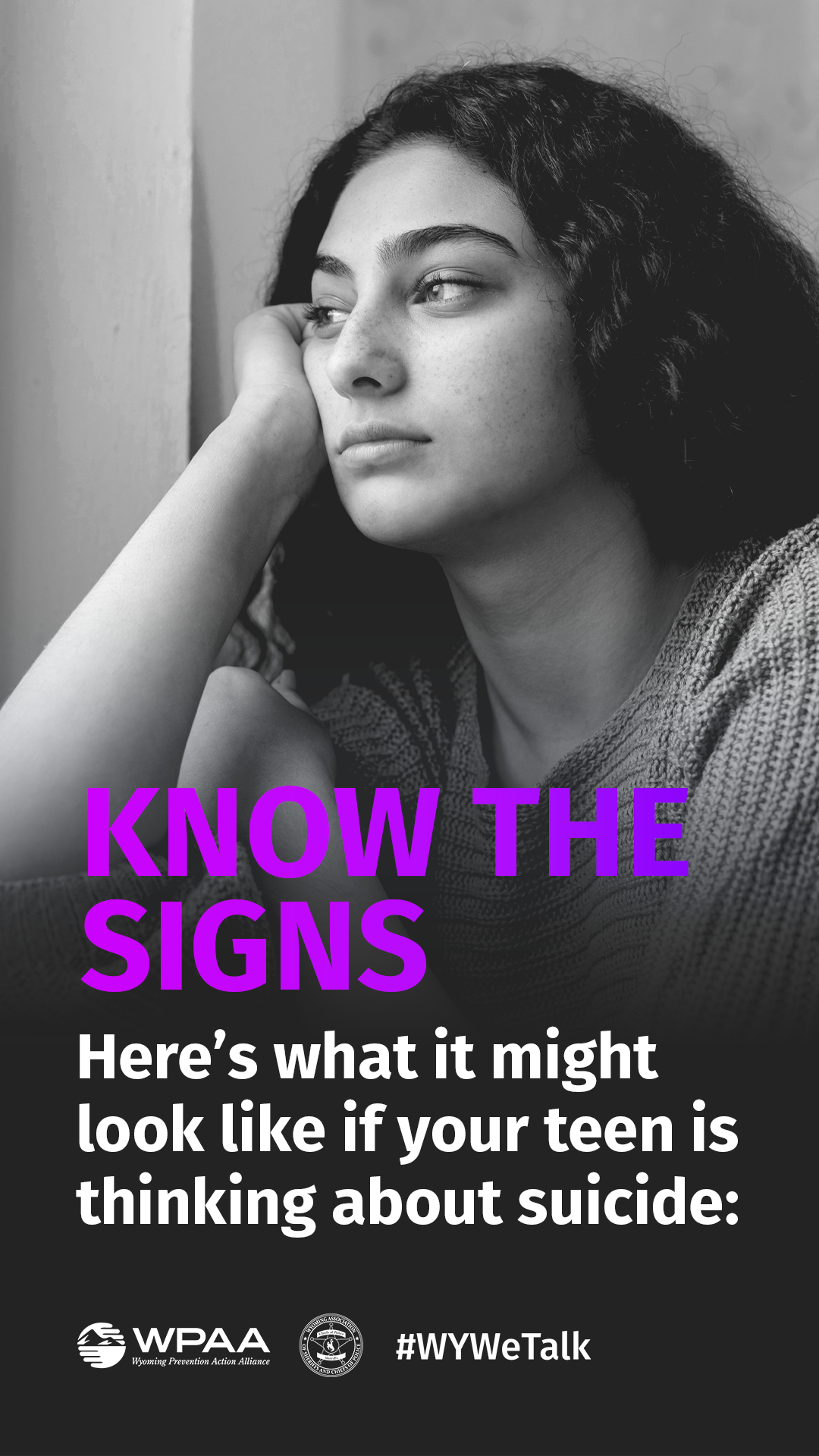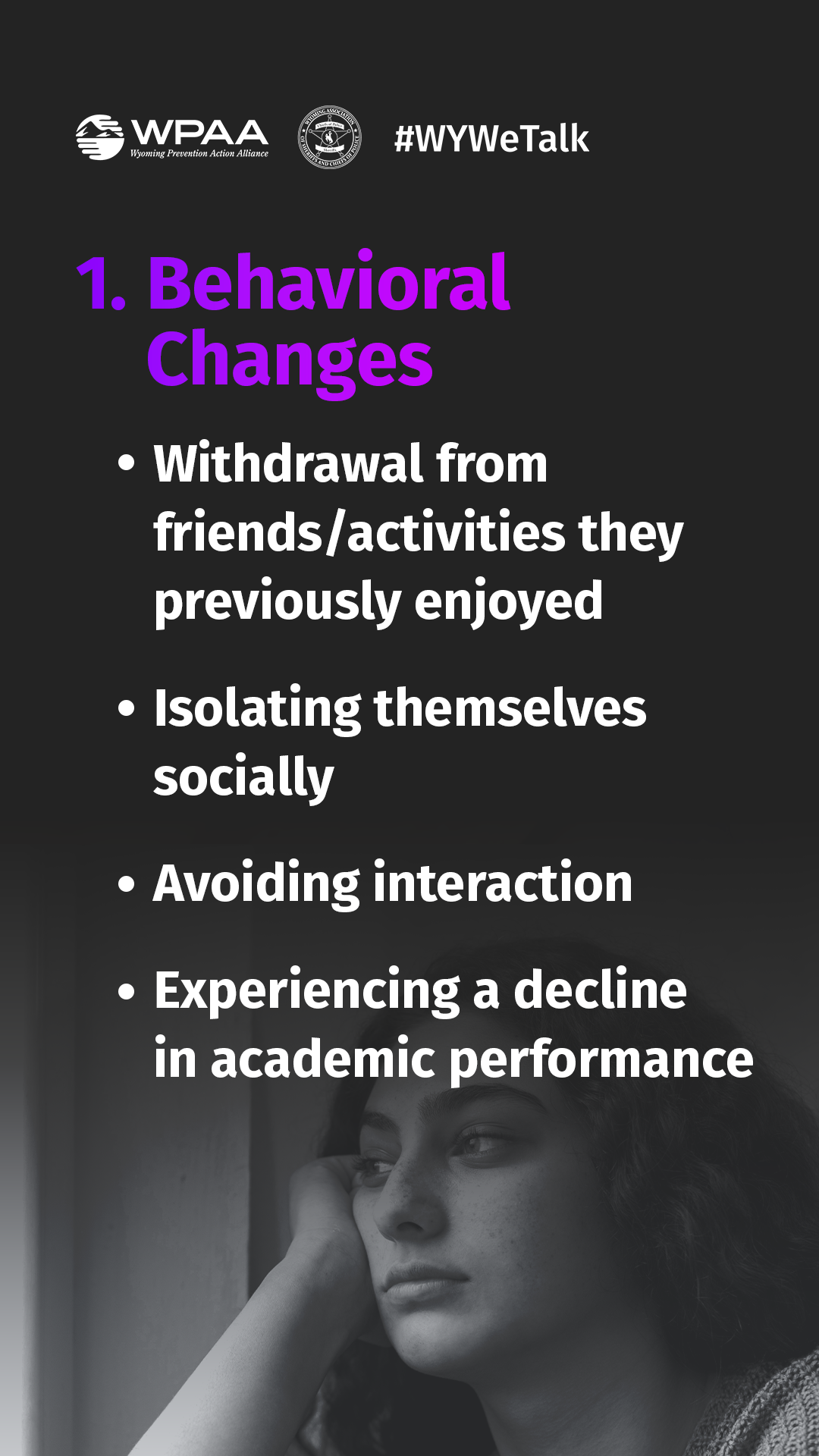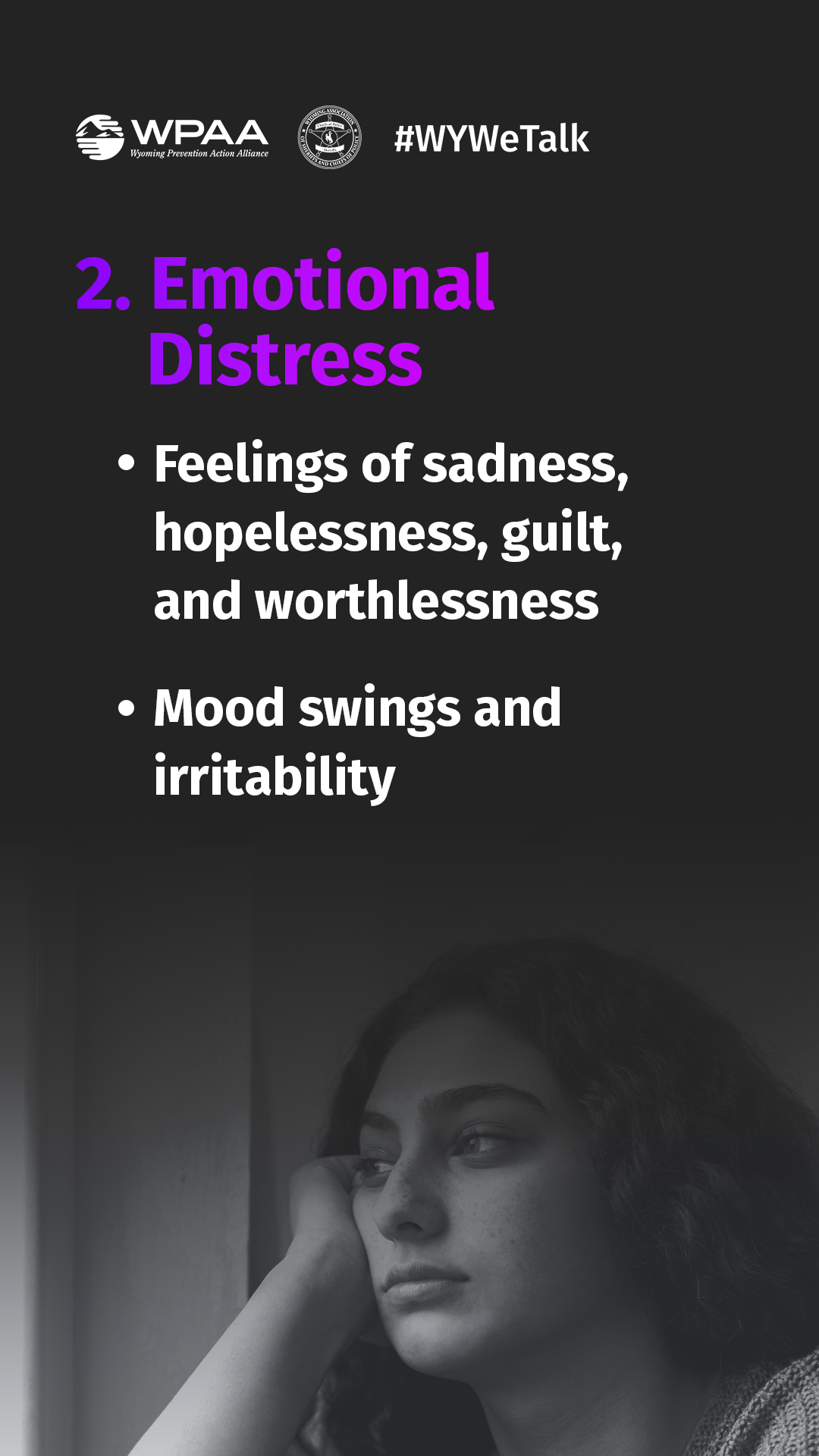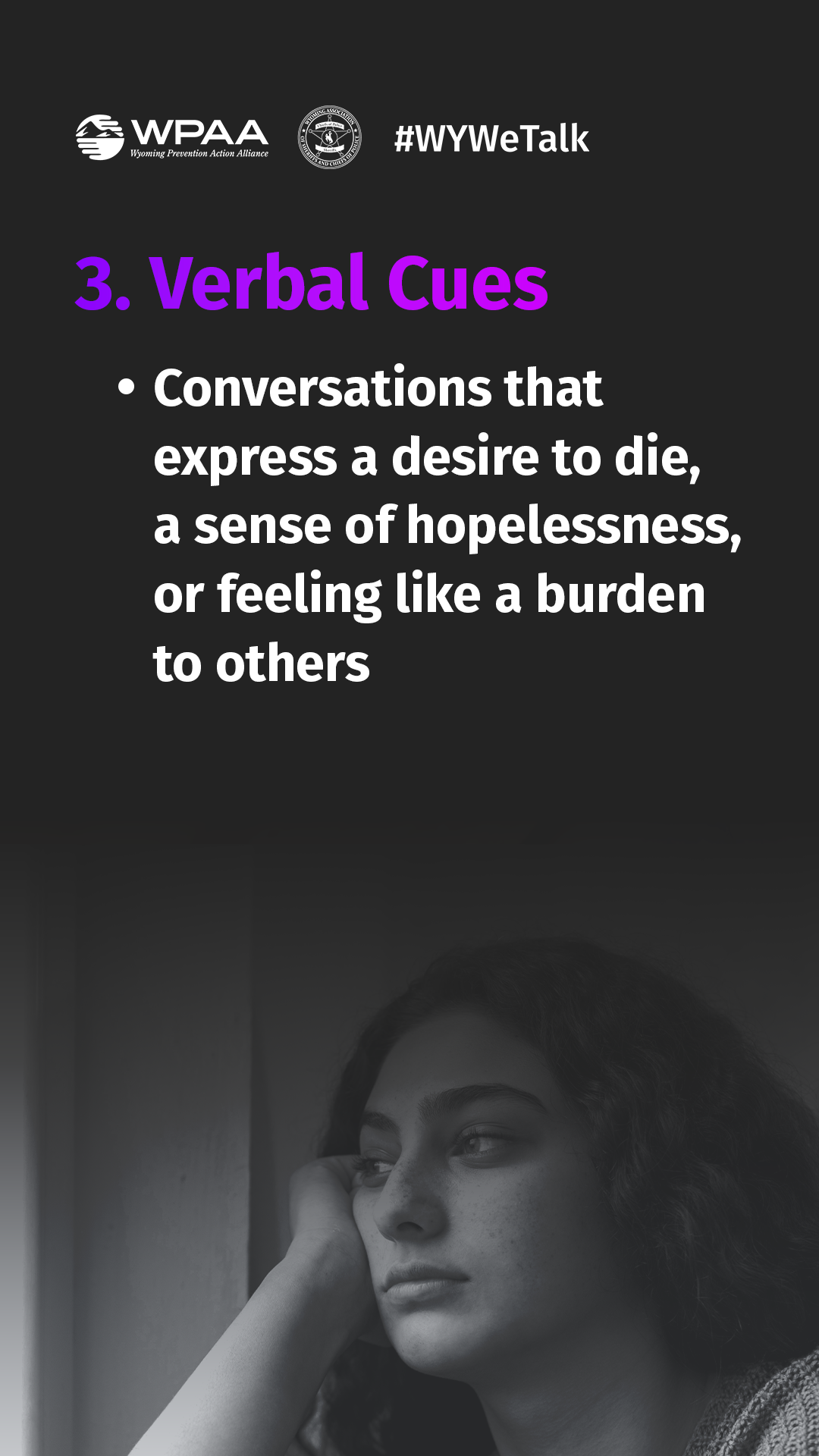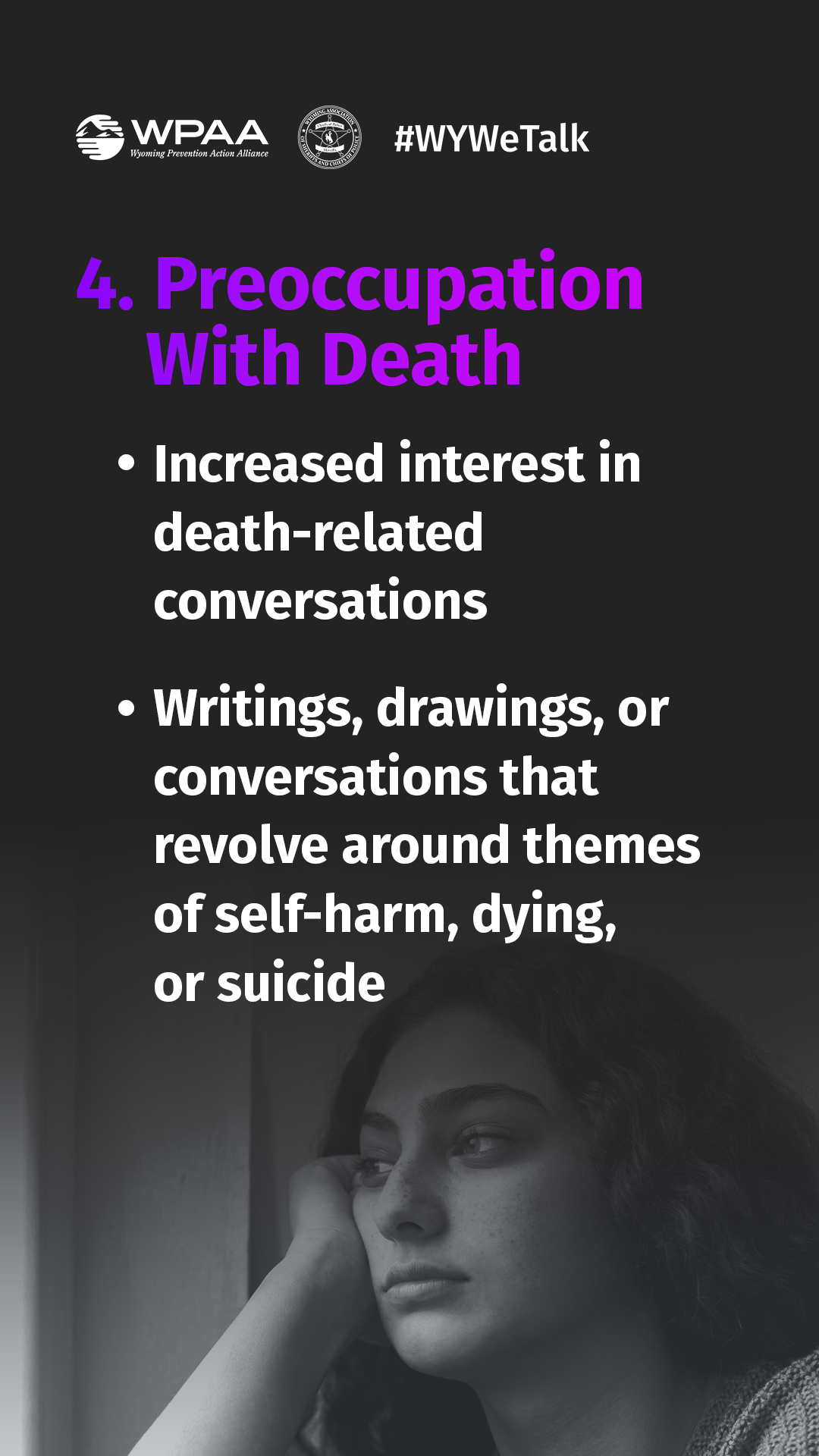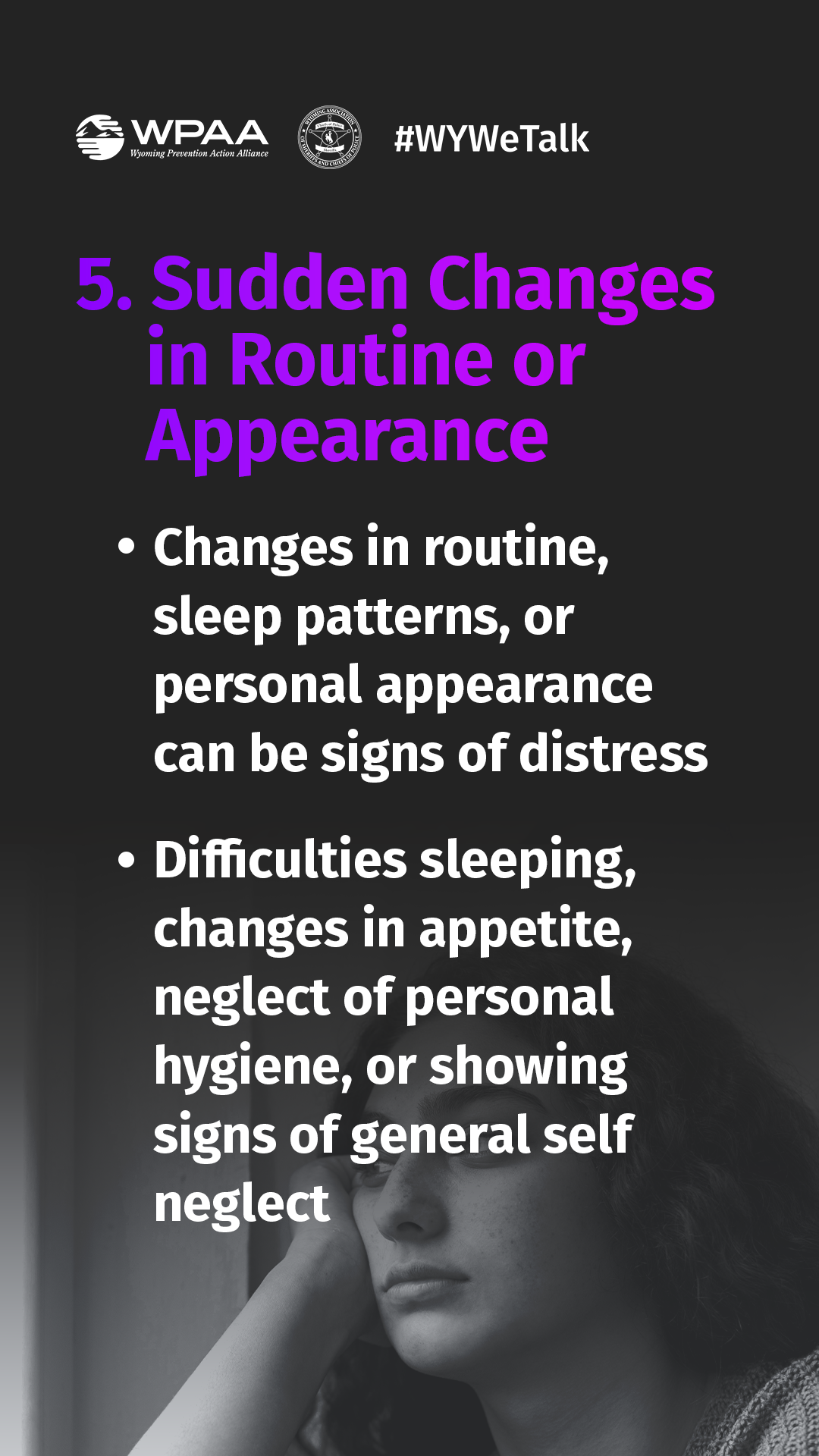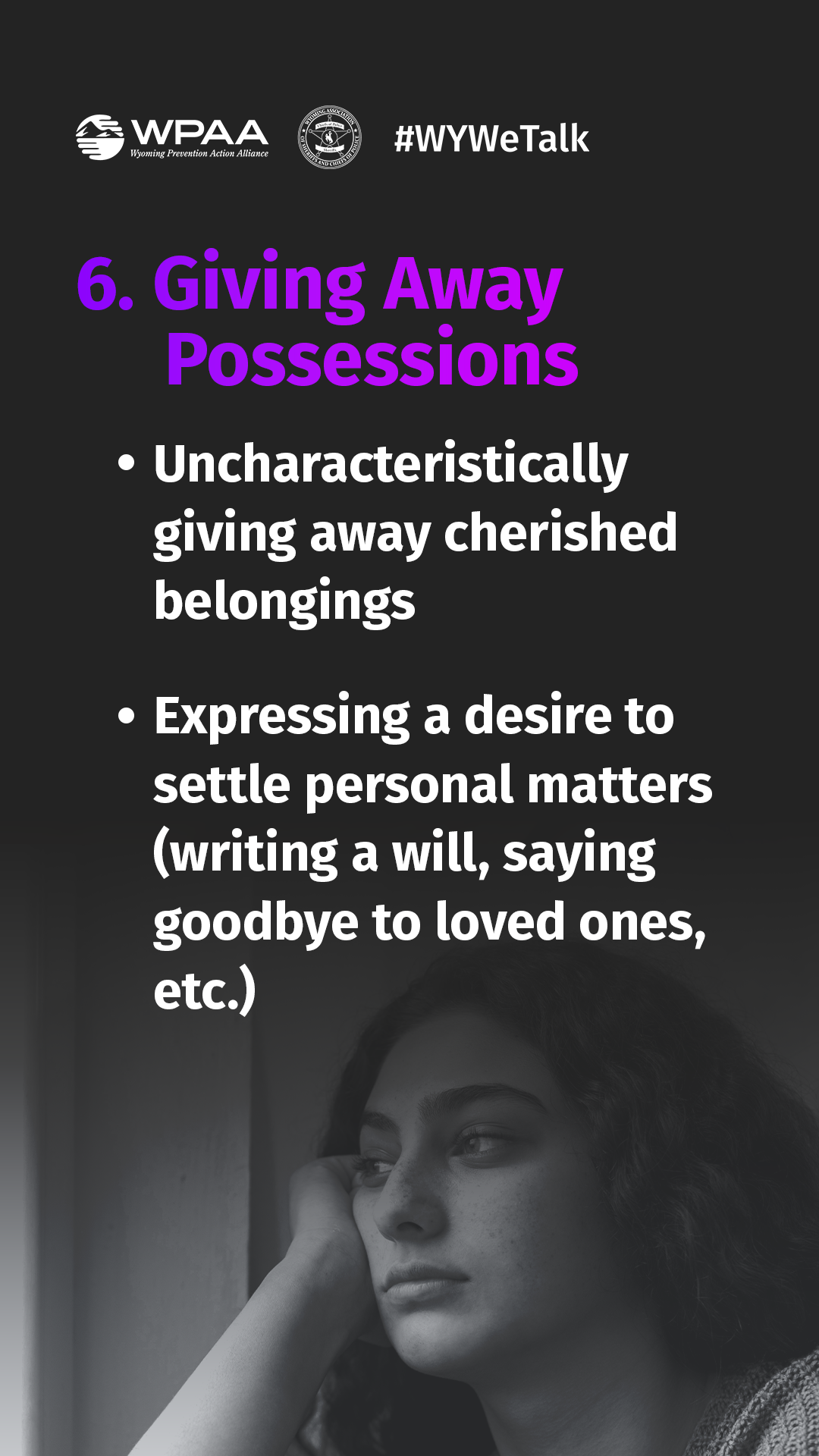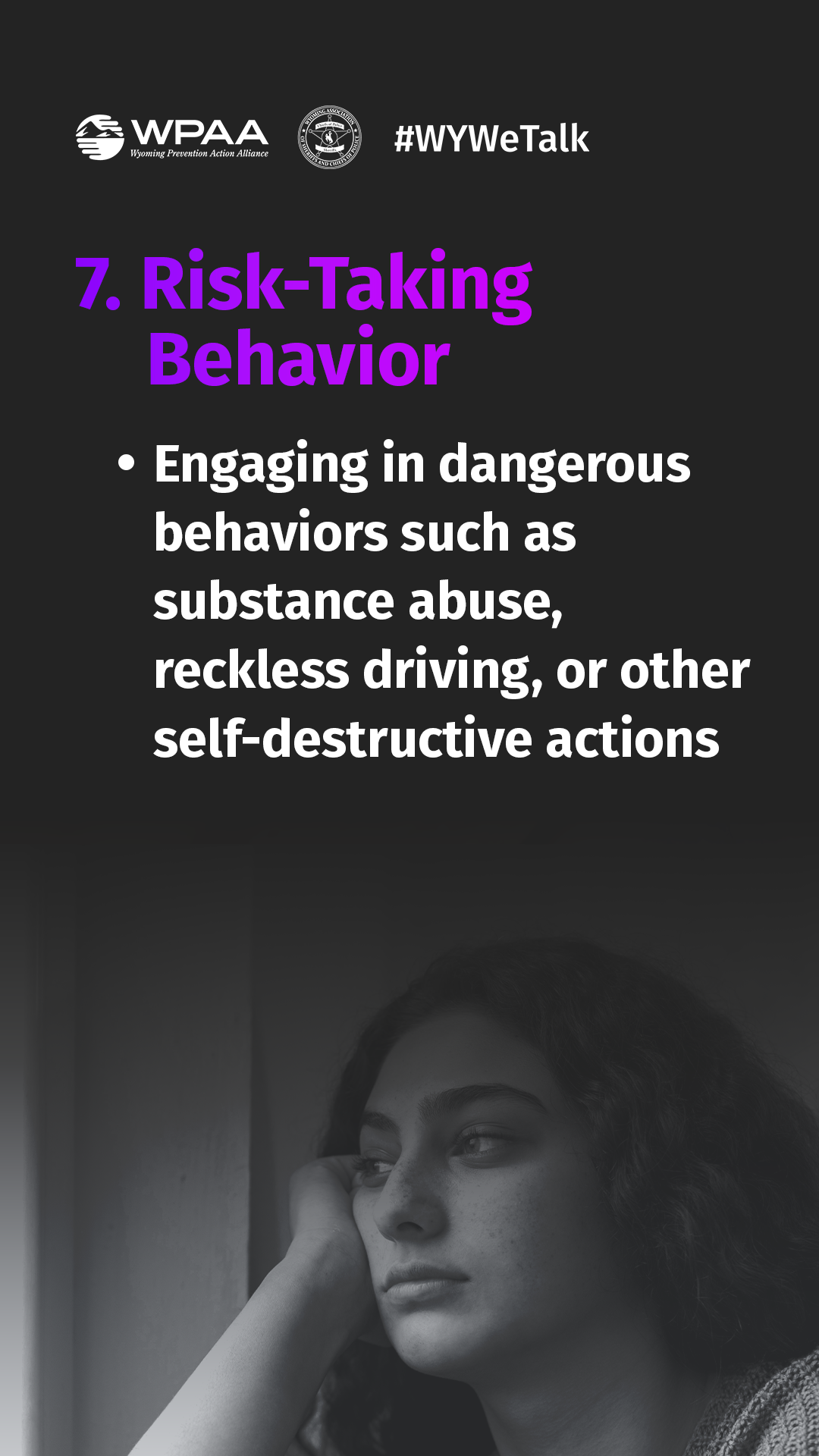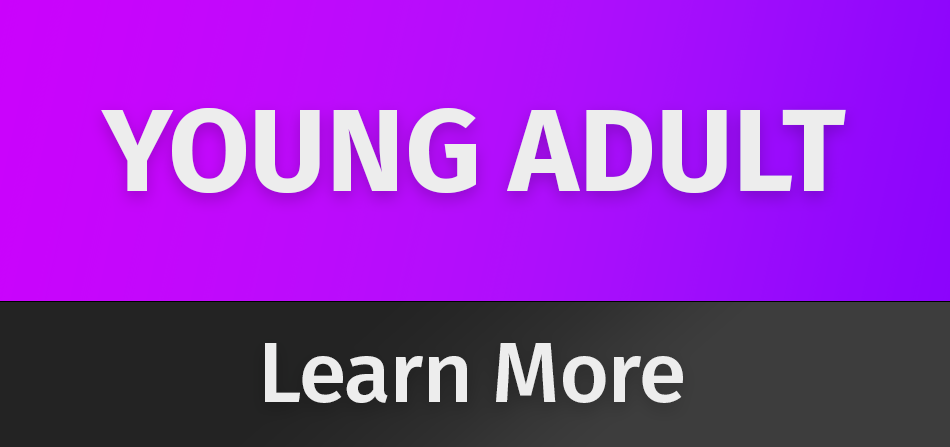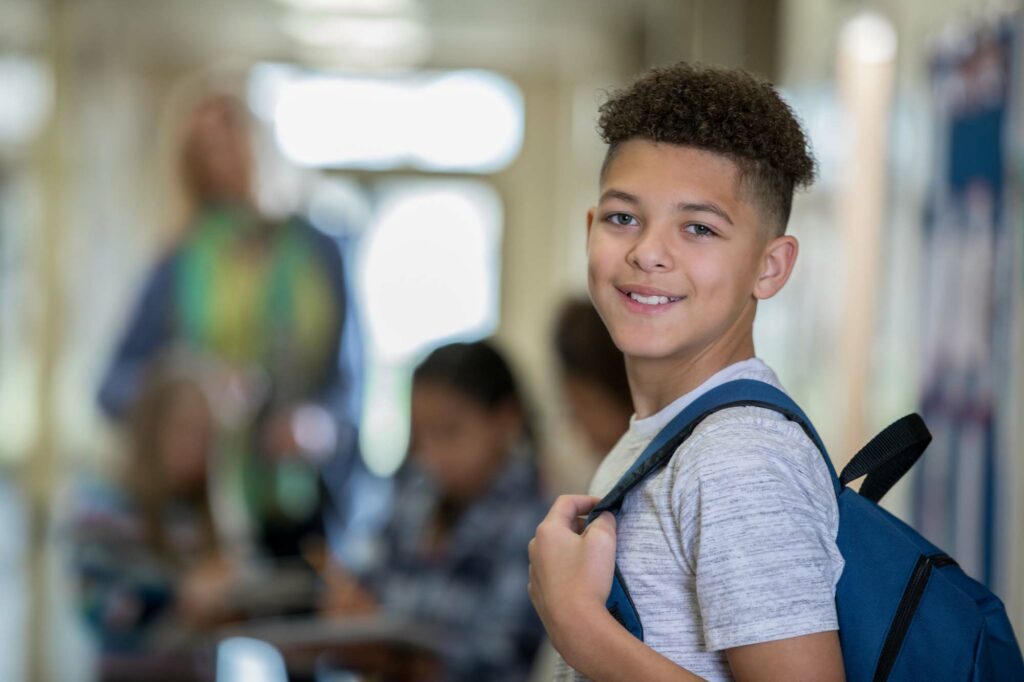Suicide
Prevention
Why We Talk About Suicide
Discussions about mental health and suicide prevention with your children can be a sensitive and challenging responsibility. We recognize the significance of addressing this critical issue and are committed to providing you with valuable insights, along with the necessary guidance, resources, and support to navigate these conversations effectively. Research shows that talking or asking about suicide will not make someone more likely to do it or put them more at risk. Engaging in an open, non-judgemental conversation with a teen about their feelings, mental health, and well-being is key to maintaining their emotional safety. At WYWETALK, we strive to empower parents, equipping them with practical strategies, expert advice, and actionable tips that foster a safe and open dialogue. Together, we can make a difference.

Facts About Teen Suicide
Suicide is one of the leading causes of death among teenagers worldwide. In the United States, suicide is the second leading cause of death for individuals aged 15 to 24 years old.
In the US, approximately 20% of high school students have seriously considered attempting suicide in the past year, while around 9% made a plan for suicide.
Contributing Factors


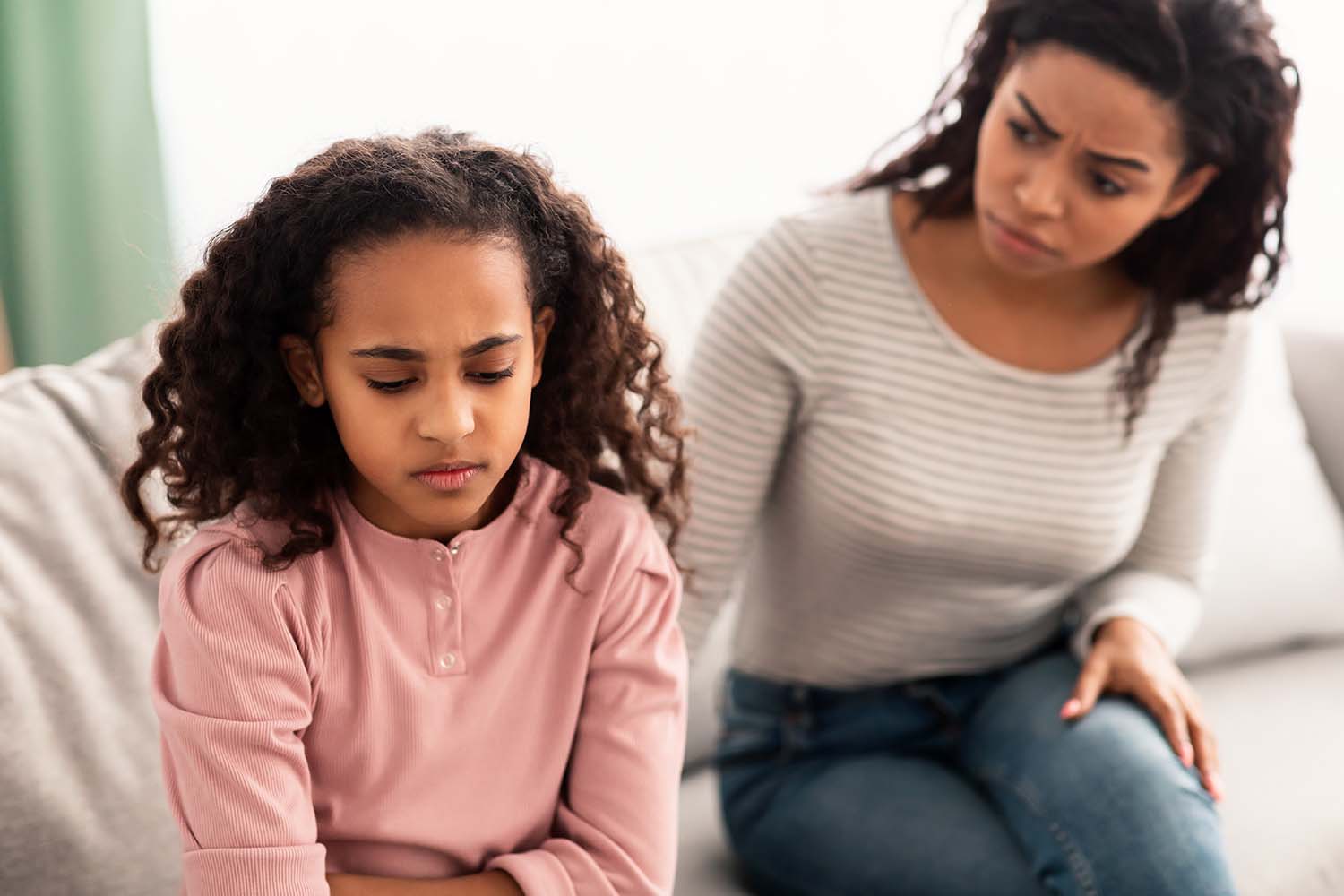




Contributing Factors
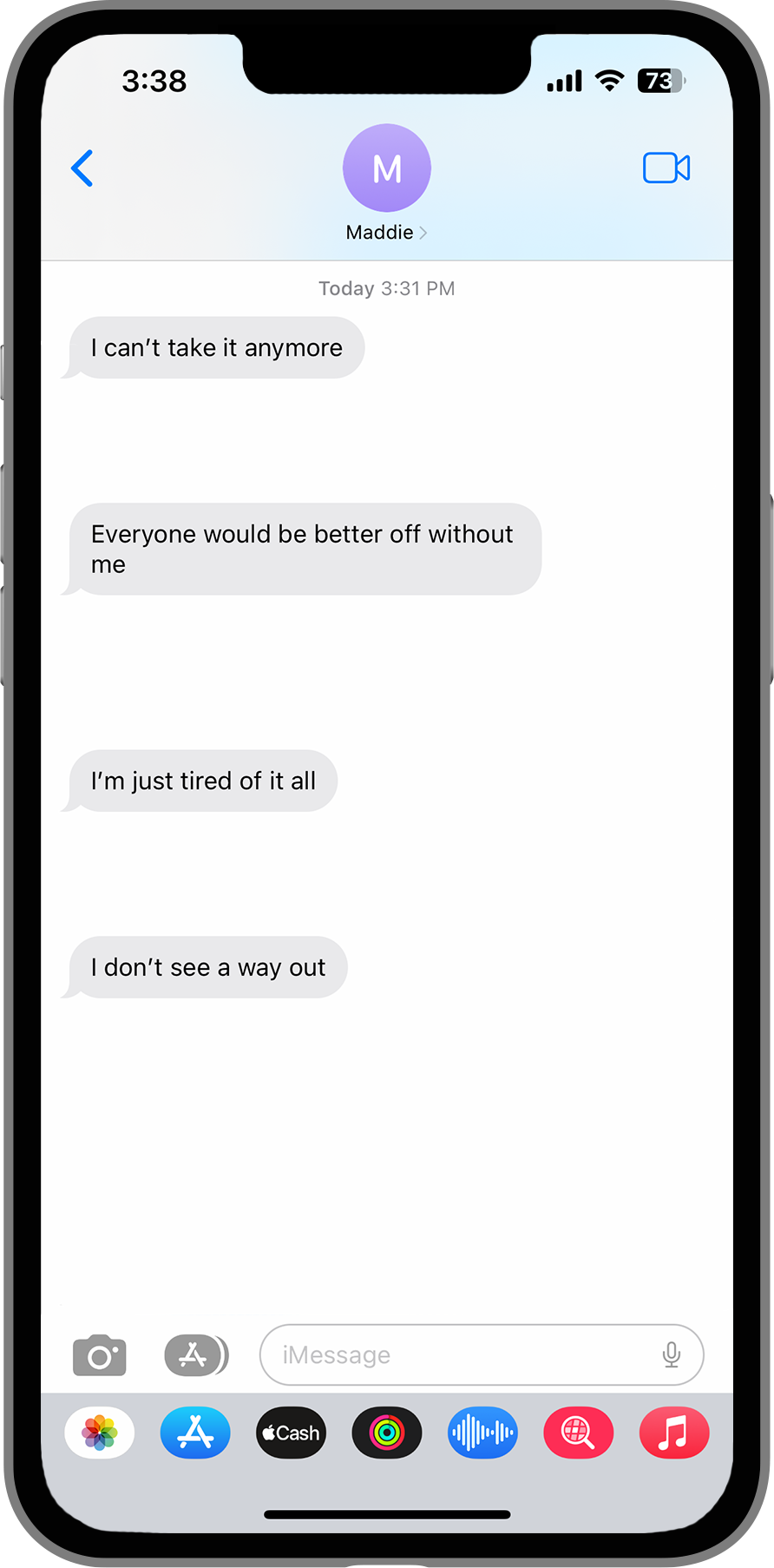
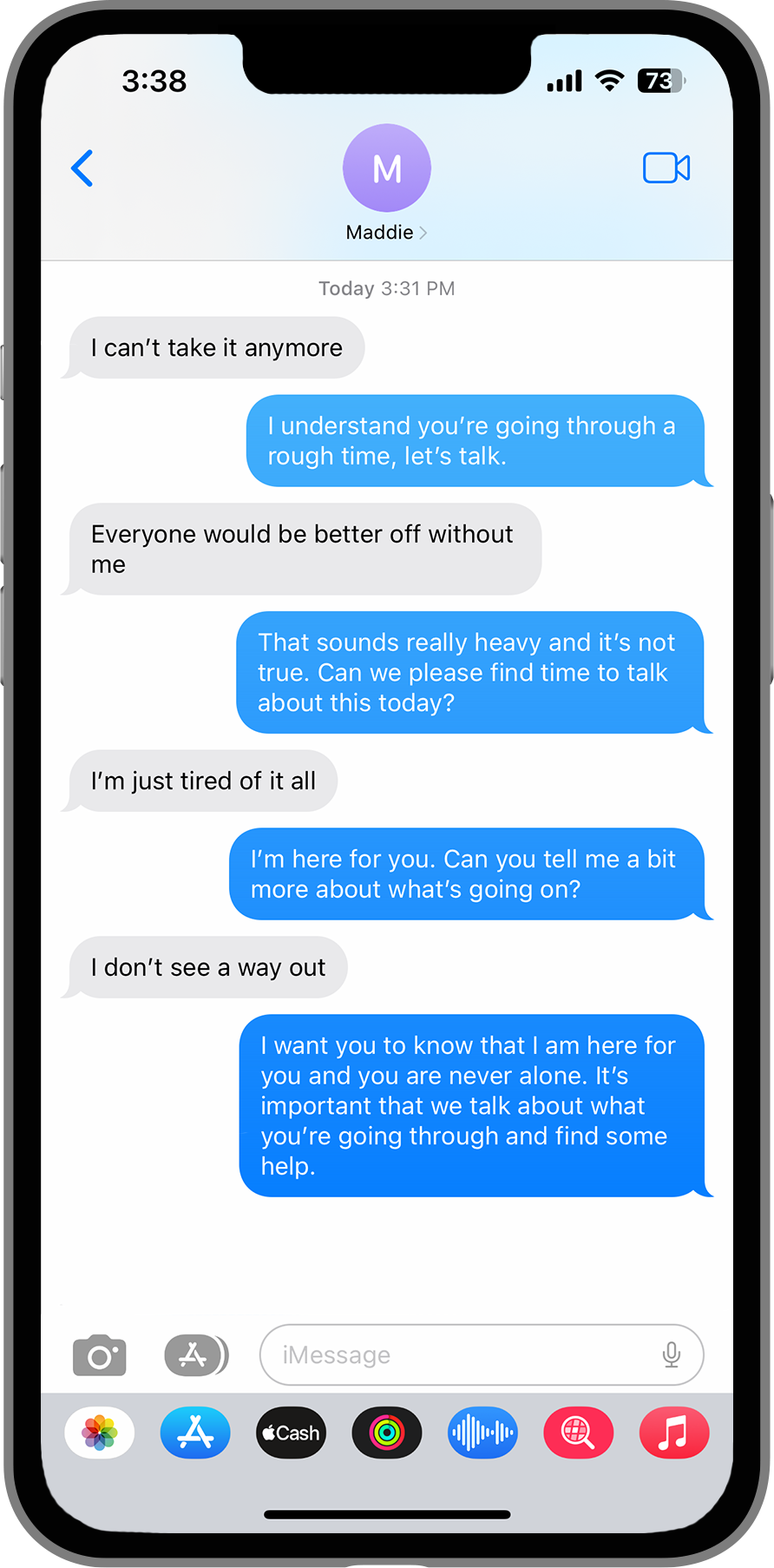
Identifying Terminology
Suicidal ideation is the presence of thoughts or ideas of self-harm or ending ones own life. When you hear someone use terms that are alluding to suicidal ideation, it can be an indicator that they might have had some thoughts about suicide. Below are some examples of things you might hear or receive from your youth, and some potential responses. It is important to use words that are natural to you and your child, and also to note that words like this need to be taken very seriously. This can be a scary conversation. It is imperative to plan a time in person to talk to your child about their feelings before those feelings turn into actions.
Drag the slider to reveal possible responses!
Know The Phrases: I can’t take it anymore Everyone would be better off without me I’m just tired of it all I don’t see a way out I wish I could just end it” or “I want to be gone
Identifying Terminology
Suicidal ideation is the presence of thoughts or ideas of self-harm or ending ones own life. When you hear someone use terms that are alluding to suicidal ideation, it can be an indicator that they might have had some thoughts about suicide. Below are some examples of things you might hear or receive from your youth, and some potential responses. It is important to use words that are natural to you and your child, and also to note that words like this need to be taken very seriously. This can be a scary conversation. It is imperative to plan a time in person to talk to your child about their feelings before those feelings turn into actions.
Know The Phrase: Lit Borg Pregame Postgame Darty Function/Func Kickback Rager Sloshed The Plug Throw Down Turnt

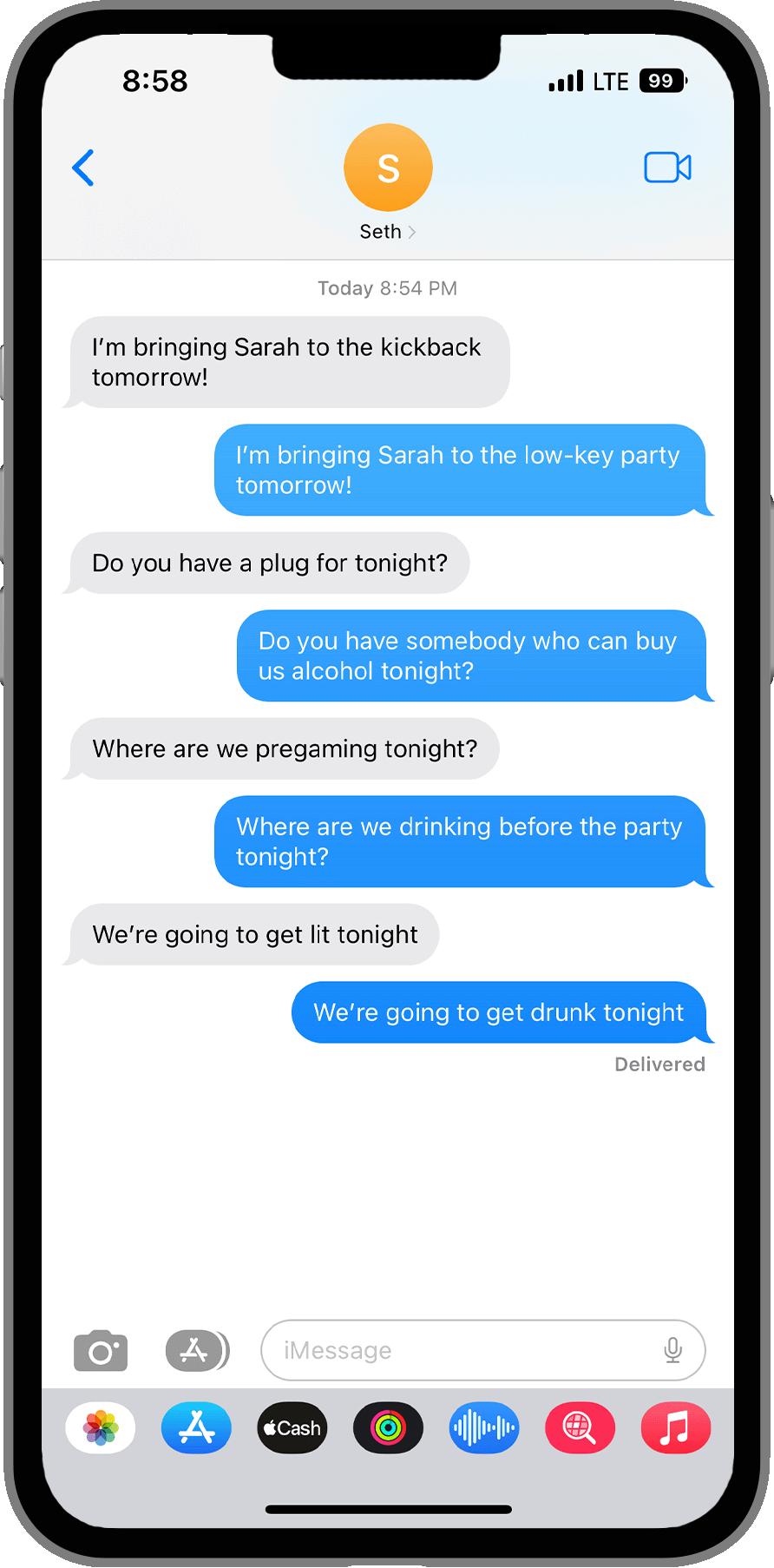
What Does It Look Like?
Teenage suicide can manifest in various ways. It is essential to understand that each persons experience is quite different. While it is important to be aware of potential signs and behaviors, it is equally important to approach the topic with sensitivity and empathy. Here are some common aspects to consider when observing warning signs of suicidal ideation in your child.
Pulse Check
Time and place is one of the most pivotal parts of great dialogue. By asking some simple open-ended questions you can truly get a pulse on if your child is in a good state of mind to have a conversation with you. Here are some examples of ways to check the pulse of your child’s openness to conversation:
If your child does not respond in a positive manner, it’s okay. Try asking a pulse check question another day.
How has your day been?
Anything interesting happened?
How are you feeling about school/work lately?
What's been on your mind lately? Anything you want to talk about?
Is there anything this week you’re looking forward to?
How was ____ (school or sport event, etc) this week?
How has your day been?
Anything interesting happened?
How are you feeling about school/work lately?
What's been on your mind lately? Anything you want to talk about?
Is there anything this week you’re looking forward to?
How was ____ (school or sport event, etc) this week?
Middle School
Engaging in conversations about suicide prevention with middle schoolers is crucial. This stage of their lives is marked not only by physiological changes, but by various influences and exposure to new experiences as well, making it essential to address the topic proactively. The aim is to initiate these conversations before any signs of distress arise or suicidal thoughts become a serious concern. Remember, these conversations should be ongoing and adapted to the needs and maturity level of your middle schooler. Encourage them to ask questions, and provide a safe space for open dialogue. If any immediate concerns arise or a child expresses thoughts of self-harm or suicide, seek professional help promptly.
Here are some talking points to consider when discussing suicide prevention:
- Have you noticed any changes in your mood or emotions lately? Are there times when you feel sad, anxious, or overwhelmed?
- What should you do if you start having feelings like that?
- Are there any times you feel really sad or really anxious? Can you tell me about a time that you have felt that way?
- Are there any specific concerns or worries that you have about bullying?
- Have you ever heard anyone talking about suicide or self-harm at school or online? What are your thoughts on these conversations?
- Are there any worries or pressures you have that you think might be too much to handle on your own?
- Who do you feel most comfortable talking to when you need support or someone to listen to you? Are there things I can do to help you feel supported?
- Do you feel you have a healthy relationship with everyone in our family? If not, what are things I can do to help?
- What are some ways that we can work together to create a safe and supportive environment for everyone?
- If one of your friends told you that they were having suicidal thoughts, what are things that you could do?
High School
High school is a critical period where discussing suicide prevention becomes increasingly vital. Struggles with mental health and the impact of suicidal ideation during this time can have profound and lifelong consequences for teenagers, and it is crucial to have ongoing conversations about suicide prevention at this stage of their lives. It is important to acknowledge that teenagers often face pressure to conform and may encounter peers engaging in risky behaviors. As parents, it is essential to approach these conversations with a non-judgmental attitude, creating a safe space for open dialogue. By fostering understanding and empathy, you can better support your teenager and address the challenges they may encounter. If any immediate concerns arise or a child expresses thoughts of self-harm or suicide, seek professional help promptly.
Here are some talking points to consider when discussing suicide prevention:
- How are you feeling about your current school load? Is your stress level manageable?
- Why do you think people would consider suicide?
- What should you do if you start to have feelings like that?
- Are there any specific concerns or worries that you have about bullying?
- Can you tell me about a time you felt alone or misunderstood? Can you tell me some ways you worked through that?
- What role do you feel social media plays in your mental health?
- Have you noticed any changes in your friends’ or classmates’ behaviors or moods that worry you? How can we support them?
- Have you ever been in a situation where someone around you was talking about hurting themselves or suicide? How did you feel?
- Have you ever heard anyone talking about suicide or self-harm at school or online? What are your thoughts on these conversations?
- What role do you think parents and schools should play in educating young people about suicide prevention?
Young Adult
As your child grows into a young adult, they are going through many life changes and are experiencing pressures in regard to relationships, work, continued education, and much more. The conversation shifts into thinking about mental health and the support systems put in place for a person in their young adult phase of life. As always, we want to come off non-judgmentally and help steward a productive conversation. We can be a resource for how to get out of scary situations, we can provide a support system for our children, and use this as an opportunity to build trust so that if those situations occur, they will reach out to you for help and the help of others. If any immediate concerns arise or your child expresses thoughts of self-harm or suicide, seek professional help promptly.
Here are some talking points to consider when discussing suicide prevention:
- How are you feeling about your transition to college/work? Is there anything particularly challenging for you?
- Have you noticed any significant changes in your mood or behavior lately? I want you to know that I’m here to listen and support you.
- Adulthood can be stressful at times. How are you coping with stress? Are there any strategies or resources that you find helpful?
- I’ve heard about the rising rates of mental health concerns among young adults. What are your thoughts on this issue?
- What role do you feel social media plays in your mental health?
- Are you aware of the mental health services available to you? Have you ever considered reaching out to them?
- Have you ever heard anyone talking about suicide or self-harm at school or online? How do you think we can help those in need?
- If you were concerned about a friend’s well-being, do you know who you could turn to for support or guidance?
- Do you think there is enough awareness about mental health and suicide prevention on campus or at work? What more do you think can be done?
Action
Checklist
Our goal is to provide you with actionable steps to promote mental health and prevent suicide among children and teenagers. This checklist offers a structured approach to address these crucial issues. By being prepared, you can actively engage with your children, build trust, and support responsible decision-making, ultimately reducing the risk of suicide and its potential consequences.
Add Your Heading Text Here
Action
Checklist
Our goal is to provide you with actionable steps to promote mental health and prevent suicide among children and teenagers. This checklist offers a structured approach to address these crucial issues. By being prepared, you can actively engage with your children, build trust, and support responsible decision-making, ultimately reducing the risk of suicide and its potential consequences.
Action
Checklist
Our goal is to provide you with actionable steps to promote mental health and prevent suicide among children and teenagers. This checklist offers a structured approach to address these crucial issues. By being prepared, you can actively engage with your children, build trust, and support responsible decision-making, ultimately reducing the risk of suicide and its potential consequences.
Need More Help?
All children are different, and as parents, we understand you are doing your best. It is okay if you don’t know how to deal with a situation and if through your conversation you find your child needs help, here are some local resources. Use the regional map to find assistance in your area, or please head to our contact page. If you are in an immediate crisis call or text 988.
Are You Ready To Talk To Your Child? Test Your Knowledge Here

Time's up

